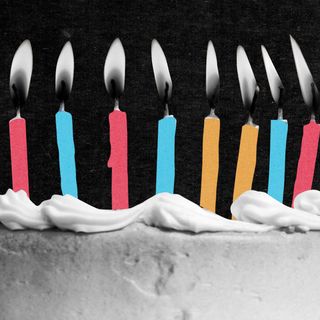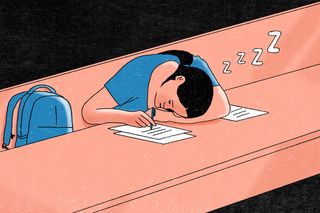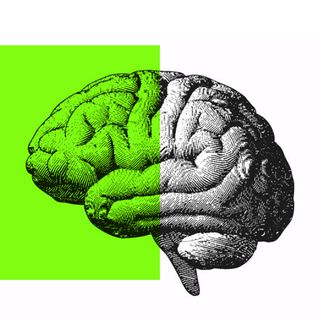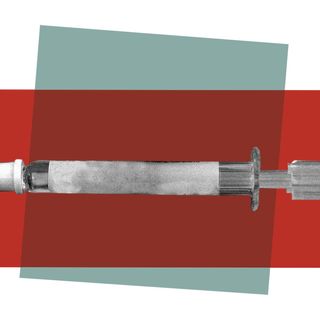
What It’s Like To Live With: Narcolepsy
“Once, I involuntarily fell asleep while hugging someone. Confused, they asked me after five minutes if I was planning to let them go.”

What It’s Like to Live With explores the stories of people who see and experience every day a little differently.
When I was in sixth or seventh grade, I started getting sleepy very often. I had never been the kind of child who took afternoon naps. The first time it happened in class, I just chalked it off as a one-time thing. Then it happened again. And again. And eventually, it got more frequent. I also started noticing other things: I had nightmares when I slept, I would hear voices and static in my head.
At first, my parents didn’t believe me. I guess it’s scary for a parent to learn that their child is “hearing things.” On the other hand, I was constantly being berated for sleeping too much. I would go home from school, I would have my lunch, and I would sleep. I would wake up to eat or drink something, and I would again go back to sleep. It was almost impossible to wake me up to do anything. I would be really groggy, really grumpy, and really angry if I was woken up. But at night when I went to bed, I would have nightmares, and I would hear things. I’d feel like I was falling off the bed or think someone was touching me.
If I heard something funny and laughed even lightly, I would lose control of my muscles and flop down on the floor. My mouth would open while my eyes would close. One minute I’d be sitting straight and the next, I’d have fallen from the chair and would be struggling to get up. The degree of struggle would depend on how severely I wanted to laugh.
I had been gaining weight. By the time I started seeing doctors, I was already overweight. They just linked my sleepiness to eating junk food and not sleeping well at night.
We were trying to “fix” the problem, but we didn’t know what the problem was. My mother would stop me from sleeping in the afternoon. So I would sleep at night. She would ask me to read my books out loud, hoping it would keep me awake. It didn’t. I would get apple juice in my water bottle to prevent myself from falling asleep at school. Exams were the most challenging. I would fall asleep while writing my paper and wake up to realize that I’ve written everything, just in really bad handwriting.
When I went to boarding school in 11th grade, I couldn’t be physically punished at school because I would stop breathing whenever they tried to physically punish me via exercises like frog jumps — so they just made me write lines to teach me a lesson.
I also dealt with migraines quite frequently. In school, I’d use my migraines as an excuse to allow myself to fall asleep instead of going to class. Also, I mean, it was true in a way because I did get migraines. I had a reputation as someone who got sick really quickly.
Then finally, towards the end of the gap year I took before college, I was taking a walk with my mother, and I told her: “I don’t know why you don’t believe me, but I keep hearing noises, and I can’t help falling asleep… Can you take me to a psychiatrist, or should I just go to one myself?” After I got insistent, she took me to a psychiatrist. I later found out this was a person my aunt had been advising her to take me to for a while.
At my very first meeting, the psychiatrist diagnosed me with narcolepsy. Turns out, my symptoms were quite characteristic of the condition. I told her about the laughter, which she said is called cataplexy. This often exists with narcolepsy. Without cataplexy, narcolepsy can be difficult to diagnose.
After this consultation, a neurologist confirmed my diagnosis after mapping my brain. That’s when we started learning more about narcolepsy. We’d never heard of it before, which is why it hadn’t factored into any of our investigations. Clearly, it hadn’t occurred to the doctors I had seen earlier either.
Related on The Swaddle:
Is This Normal? “I Feel Sleepy When I’m Stressed”
To break it down, it’s a neurological disorder. There’s a part of the brain that secretes the hormone orexin, which is responsible for regulating our sleep cycles. In my body, there’s not enough orexin. So, it doesn’t matter how well I sleep, or how much I sleep, my body just can’t register the fact that I have rested. It constantly thinks I need to rest more and shuts down my body when it thinks I have gone without sleep for too long. But it still doesn’t register that I’m resting. At the same time, I continue to do the tasks I was doing before I fell asleep, because the body still thinks it’s awake. This explains why I was able to write my exams even after I fell asleep.
I felt so relieved finally knowing none of it was my fault; I cried. All these years, people told me I was lazy, that I wasn’t trying hard enough, that I was just shirking my responsibilities. It really took a toll on my self-esteem.
Nobody had ever believed me when I told them I couldn’t control falling asleep. My parents felt quite guilty after learning my diagnosis; my mother more than my father. They let me do whatever I wanted for the next couple of years, which wasn’t entirely a good thing either. I was so overwhelmed by the joy of having “been right” for so many years that I didn’t end up doing much for a while. I suddenly lived supervision-free.
Incidentally, the diagnosis came about a month before I was supposed to go away for college. It didn’t factor into my decision though. We had informed the college on day one that I had narcolepsy, and that I was also at risk for anxiety and depression, which I already struggled with. They agreed to take care of me. The wonderful thing is, they actually did. I think I was the only person they made so many concessions for.
Once, I involuntarily fell asleep while hugging someone. Confused, they asked me after five minutes if I was planning to let them go.
During this time, I was also on a lot of medicines; one to help me stay awake, one to help me sleep better at night, one for cataplexy, one to ensure all of these medicines (and most likely my weight issues) don’t give me diabetes, and various vitamins to help with the deficiencies caused by everything else. But they didn’t really help. I still had my nightmares, I still fell asleep randomly, I was still experiencing cataplexy and another form where if I exerted myself too much, my back would stiffen up. In fact, the medicines had somehow increased my cataplexy. They also made really calm but not in a good way; they suppressed my personality. I had to go back home for a year because I was falling sick quite frequently, missing classes, and struggling to wake up.
When I told my doctor that the medicines were making me feel like I was underwater and that everything felt like things were moving too slowly, I was told to stop taking them. I had to deal with withdrawal, but then I started trying to manage my lifestyle to deal with narcolepsy a little better. I haven’t taken any allopathic medicine since.
I also switched to Ayurveda because allopathy was clear that it can’t really help me much. At present, scientists are doing orexin-related trials on animals; it would take them a long time to actually develop something for human-use. And allopathy did a bad job of managing my symptoms anyway. Instead now, I try to eat better, exercise more. Ayurveda has been helpful, too, but only alongside lifestyle changes.
About two years into college, my parents decided to stop giving me a free pass for everything and got more involved in my health issues. That’s when I was able to maintain some discipline. They, basically, went from, “you don’t have any problems” to “oh, we’re so sorry, do whatever you want” to “okay, we have an issue, let’s deal with it.” And that’s where we are now.
I still have nightmares. I hallucinate once in a while, but the frequency has greatly reduced. My migraines have almost disappeared after I was treated by a chiropractor. I graduated college, too. Took me two years longer because I had to drop a few semesters to rest, and allow my body to recuperate. But it’s done now.
This interview has been condensed and edited for clarity. As told to Devrupa Rakshit.
Devrupa Rakshit is an Associate Editor at The Swaddle. She is a lawyer by education, a poet by accident, a painter by shaukh, and autistic by birth. You can find her on Instagram @devruparakshit.
Related


Chronic Pain May Alter Brain Chemistry, Affect Emotional Regulation, Research Shows
